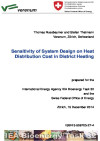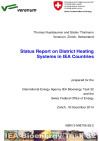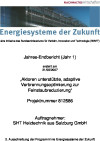Suchergebnisse für "Factsheet: Energietechnologien gestalten, die für alle sinnvoll und nutzbar sind"
Zukunftsquartier Österreich - Development of Quality-assured positive energy district concepts
The aim of this project is therefore to make a significant contribution to the (further) development and testing of systematically interlinked and innovative overall solutions for the implementation of quality-assured positive energy districts in Austria and to prepare the first demonstration projects.
Sensitivity of System Design on Heat Distribution Cost in District Heating (2014)

IEA Bioenergie Task 32
Thomas Nussbaumer, Stefan Thalmann
Herausgeber: Verenum und Schweizer Bundesamt für Energie
Englisch
Downloads zur Publikation
Status Report on District Heating Systems in IEA Countries (2014)

IEA Bioenergie Task 32
Thomas Nussbaumer, Stefan Thalmann
Herausgeber: Verenum und Schweizer Bundesamt für Energie
Englisch, 48 Seiten
Downloads zur Publikation
Aktoren unterstützte, adaptive Verbrennungsoptimierung zur Feinstaubreduzierung

Dipl.-Ing. Herbert Hartl, MBA
Herausgeber: Bundesministerium für Verkehr, Innovation und Technologie
Downloads zur Publikation
e80^3-Buildings - Sub project 2: Concept development
Based on the selection of suitable demonstration projects in Subproject 1 an innovative concept for passive and active building envelopes and energy supply of so called "Plus Energy Buildings" (renovation) has been developed.
"gugler! build & print triple zero" - subproject 2: building with recycros
Building with recycros is working out basics in order to close the cycle of materials in the building sector as well as to increase the usage of recycled materials (recycros). The existing material cycles in the building sector are going to be analysed. Furthermore, there will be a catalogue presented, covering the actual situation of which materials are used in today´s engineering and how the waste is treated. The project will be completed with a summary of results and a proposal of concrete materials and constructional systems for the building project gugler.
"Building of Tomorrow" on the road - knowledge transfer of the results from "Building of Tomorrow" to existing traineeships
Knowledge transfer of the programme "Building of Tomorrow" to specialists on universities, advanced technical colleges, polytechnics, construction academies, administration academies. Themes: Energy, Construction and Building Physics, Ecology and Architecture and Sociology.
Interregional Logistics- and Procurement Network for Forest Fuel in Austria
A concept for a cooperative forest fuel supply chain network for a large part of Austria (regions of Salzburg, Upper Austria, Lower Austria, Vienna) is developed in order to minimise transport-, storage- and total system costs while simultaneously increasing supply guarantee for the plants.
Network material ecology for hospitals
The use of sustainable building materials is a key issue for sustainable development of the building sector. Emission free indoor air, minimized embodied energy of construction materials and health risk for construction workers are three main aspects. Between five hospital operators in Austria, Germany and Switzerland a practical exchange of experience focused on material ecology will be initiated and moderated.
Fibre composites with natural adhesive
Developing of suitable bonding agents, fibres and processing technologies for the production of form stable fibre composites made of natural components. Production of prototypes like boards and moulded parts. Material testing.
UrbanEnergyCells - Requirements for the implementation of energy cells in future energy system designs
The transformation of the currently hierarchical electricity system into a renewable, decentralized electricity system poses major challenges for the actors in the energy industry and society. Most of the installed decentralized renewable energy sources are installed in rural areas, due to easier legal implementation and shorter decision-making pathways. However, the energy density in urban areas is significantly higher, resulting in a transport of electrical energy to the consumption centers.
Beacon of innovation gugler cross media, ecoeffective zero energy cross media enterprise featuring zero-emission, zero energy, zero waste
The aim of the flagship project is a new dimension of sustainability (cradle to cradle, ecoeffective zero energy enterprise) for business operation and building, which means zero emission, zero energy, zero waste. This will be shown on the basis of a beacon of innovation: Gugler GmbH, a modern sustainable media services enterprise (traditional print and new media) will extend their current building from about 2100 square meters and about 90 employees to about 5,000 square meters.
Ecological restoration of a listed building with passive house technologies
Ecological exemplary reconstruction of the "Haidenhof"-building, Bad Ischl, Upper Austria. Building refurbishment with respect to monumental protection and newest passive house technologies. Reorganisation of the former residential building to an academy of arts and culture.
IEA SHC Task 59/EBC Annex 76: Deep Renovation of Historic Buildings - Towards lowest possible energy demand and CO2 emission (nZEB)
The goal of Task 59 was to document international best practice examples (knowledge base), develop a multidisciplinary planning process, and develop holistic retrofit solutions for historic buildings. As a knowledge base, the Historic Building Retrofit Atlas (www.HiBERatlas.com) emerged from the project. In the HiBERatlas more than 55 best practice examples are documented. In addition to the management of Subtask A (Knowledge Base) and Subtask C (Conservation compatible retrofit solutions & strategies), innovative technical and organizational retrofit solutions, which have already been applied in national demonstration projects and tested in practice, have been incorporated and further developed through the Austrian participation.
Ecological Passive houses

Discussion of transfer of know how for ecological passivehouses, networking (national and international)
Production and upgrading of fermentation gas at the location Wals-Siezenheim to be feed into the natural gas distribution network
Production and multistage purification process of approx. 150 m³/ h biogas in Wals-Siezenheim. Prove the feasibility of trouble-free feeding of biogas into the natural gas grid of the Salzburg AG within an operation period of 3 years.
baubookPlus - Expansion of an extensive knowledge database of sustainable buildings
By the foundation of the baubook GmbH in 2008 the two databases of building products "öbox" and "ixbau.at" have been merged. The new database baubook was expanded. Essential functions (central product declaration, decentral quality management) and fields of products were added.
RepaMobil - Reduction of market barriers for product-service-systems, especially repair- and other household services by setting up central service points at big company sites where a lot of potential customers pass by
Feasibility study / implementation concept for central repair- and service points (mobile or stationary) for repair- and other household services located directly at big company sites; raising the demand for sustainable services by private households.
Developing of a application for central visualisation of the energy and resource demand in a private household "ZENVIS"
The main focus of the research project ZENVIS is set on the analysis of the benefits provided by a "visualization device", which gathers the readings of energy and resource consumption (electricity, gas, water, heat energy and fuel consumption). This device ought to find its use in households and to allow the consumer to observe and to control his energy consumption.
Inter-linked design as a strategy towards sustainable buildings - removing deficiencies of learning and of diffusion

The aim is to investigate the role of inter-linked design team organisation in the design of sustainable buildings and to formulate ready-to-use recommendations and guidelines for dissemination.
